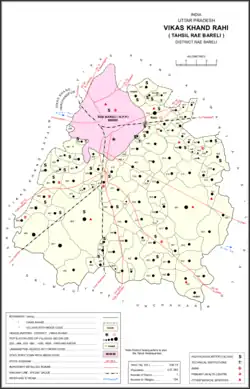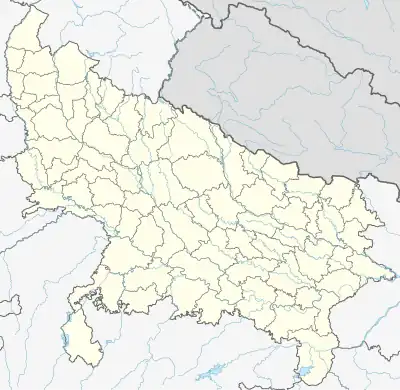Chak Rar
Chak Rar is a village in Rahi block of Rae Bareli district, Uttar Pradesh, India.[2] It is located 11 km from Rae Bareli, the district headquarters.[3] As of 2011, it has a total population of 1,005 people, in 182 households.[2] It has one primary school and no medical facilities and it hosts a weekly haat but not a permanent market.[2] It belongs to the nyaya panchayat of Lodhwari.[4]
Chak Rar
Chak Rār | |
|---|---|
Village | |
 Map showing Chak Rar (#520) in Rahi CD block | |
 Chak Rar Location in Uttar Pradesh, India | |
| Coordinates: 26.182614°N 81.35675°E[1] | |
| Country | |
| State | Uttar Pradesh |
| District | Raebareli |
| Area | |
| • Total | 1.484 km2 (0.573 sq mi) |
| Population (2011)[2] | |
| • Total | 1,005 |
| • Density | 680/km2 (1,800/sq mi) |
| Languages | |
| • Official | Hindi |
| Time zone | UTC+5:30 (IST) |
| Vehicle registration | UP-35 |
The 1951 census recorded Chak Rar as comprising 3 hamlets, with a total population of 372 people (199 male and 173 female), in 85 households and 79 physical houses.[5] The area of the village was given as 368 acres.[5] 13 residents were literate, all male.[5] The village was listed as belonging to the pargana of Rae Bareli South and the thana of Nasirabad.[5]
The 1961 census recorded Chak Rar as comprising 3 hamlets, with a total population of 388 people (191 male and 197 female), in 93 households and 88 physical houses.[6] The area of the village was given as 368 acres.[6]
The 1981 census recorded Chak Rar (as "Chakrar", one word) as having a population of 577 people, in 103 households, and having an area of 148.93 hectares.[3] The main staple foods were listed as wheat and rice.[3]
The 1991 census recorded Chak Rar as having a total population of 705 people (372 male and 333 female), in 122 households and 122 physical houses.[4] The area of the village was listed as 150 hectares.[4] Members of the 0-6 age group numbered 159, or 22.5% of the total; this group was 54% male (86) and 46% female (73).[4] Members of scheduled castes numbered 121, or 17% of the village's total population, while no members of scheduled tribes were recorded.[4] The literacy rate of the village was 24.5% (146 men and 27 women).[4] 192 people were classified as main workers (188 men and 4 women), while 136 people were classified as marginal workers (all women); the remaining 377 residents were non-workers.[4] The breakdown of main workers by employment category was as follows: 107 cultivators (i.e. people who owned or leased their own land); 57 agricultural labourers (i.e. people who worked someone else's land in return for payment); 3 workers in livestock, forestry, fishing, hunting, plantations, orchards, etc.; 1 in mining and quarrying; 0 household industry workers; 4 workers employed in other manufacturing, processing, service, and repair roles; 6 construction workers; 2 employed in trade and commerce; 4 employed in transport, storage, and communications; and 8 in other services.[4]
References
- "Geonames Search". Do a radial search using these coordinates here.
- "Census of India 2011: Uttar Pradesh District Census Handbook - Rae Bareli, Part A (Village and Town Directory)" (PDF). Census 2011 India. pp. 219–43. Retrieved 10 August 2021.
- Census 1981 Uttar Pradesh: District Census Handbook Part XIII-A: Village & Town Directory, District Rae Bareli (PDF). 1982. pp. 94–5. Retrieved 10 August 2021.
- Census 1991 Series-25 Uttar Pradesh Part-XII B Village & Townwise Primary Census Abstract District Census Handbook District Raebareli (PDF). 1992. pp. xxiv–xxviii, 138–9. Retrieved 21 October 2021.
- Census of India, 1951: District Census Handbook Uttar Pradesh (42 - Rae Bareli District) (PDF). Allahabad. 1955. pp. 142–3. Retrieved 3 November 2021.
{{cite book}}: CS1 maint: location missing publisher (link) - Census 1961: District Census Handbook, Uttar Pradesh (39 - Raebareli District) (PDF). Lucknow. 1965. pp. xlvi-xlvii of section "Rae Bareli Tahsil". Retrieved 10 August 2021.
{{cite book}}: CS1 maint: location missing publisher (link)